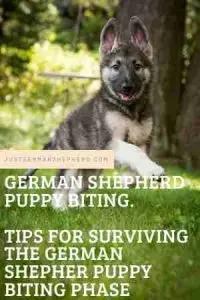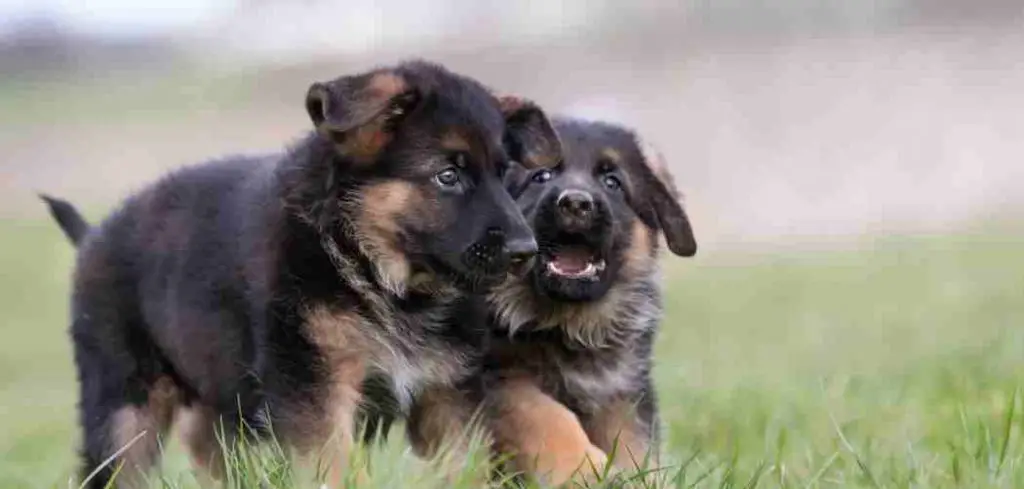
With any new German Shepherd Puppy biting while they are young is par for the course and something every owner has to contend with.
Table of Contents
German Shepherd Puppy Biting Phase - The Survival Guide
German Shepherd Puppy biting and mouthing is a common behavior but it can quickly become a serious problem. German Shepherds grow into large, strong dogs, so this behavior needs to be tackled as early as possible to ensure your dog stays well rounded, social and friendly.
There are a few reasons that your German Shepherd may bite and it’s important to understand them and when they may occur to ensure you as an owner can help your puppy as they grow.
It could be due to the excitement of a play session, pain from teething or dental issues, or lack of appropriate training – Let’s take a look at the different areas in more depth and some tips on how to nip your German Shepherd Puppy biting phase in the bud early.
Play Time
Puppies play with their littermates by wrestling and biting. If one puppy gets a little too rough, their playmate will give a high-pitched yelp. This lets the biter know that they went too far. This is how all puppies learn to be gentle during play. The puppies’ mother will also intervene if play sessions get too rough.
Humans don’t have a thick fur coat to protect their skin from sharp puppy teeth, so biting and nipping can be painful. Puppies also do not understand that humans do not play with their mouths. It is your responsibility to teach puppies appropriate ways to play with people, especially when they come into contact with children.
How to Stop Your German Shepherd Puppy Biting During Play
Stopping nipping or biting during play is very simple, but you need to be consistent. whenever your puppy nips or bites at you, immediately give a firm “no” or “ah-ah” and end the play session by walking away. Doing this every time will quickly teach your pup that biting means the game stops. If he wants to continue playing he has to be gentle.
When you initiate a play session, try not to encourage roughhousing. instead offer him toys that are acceptable to chewed or bitten. He will be more likely to seek out these toys when he feels the need to chew, rather than attempting to gnaw on your fingers!
This is especially important if your German Shepherd is older. The bigger the dog, the stronger the bite. Even a play bite from an adult dog can cause an injury. You may find that it takes your adult dog longer to stop mouthing and biting because he has lived his whole life thinking that this behavior is ok.
If there are children in the household, or you have friends and relatives who visit with their children, you should involve them in the training process. Children love puppies and get excited when they play together. This can encourage the puppy to nip. Teach children that they must be calm and gentle. Show them which toys the puppy can play with and explain how they should interact with the puppy when they visit your home.
This makes play sessions save for both the puppy and the children and prevents any accidental injuries. Puppy teeth may be small, but they are sharp and are easily capable of breaking through the skin.
Teething
All puppies go through a teething phase, just like human children. They are born without teeth and their sharp puppy teeth start coming through between 6 and 8 weeks of age. At around 14 weeks, their puppy teeth start falling out to make way for their adult milk teeth.
This is often an uncomfortable and painful process. His gums will be sore and maybe even a little swollen. Your puppy will look for ways to relieve this discomfort. Chewing makes them feel better. If your puppy starts trying to chew on your hand, he may be doing so because his teeth are growing.
Keep an eye out for any stray teeth around the house. This is a good indication that he has started to lose his baby teeth. He may also be drooling more than normal or whining and pawing at his face.
How to aid your German Shepherd Puppies teething
There are a few different options available to your to help your puppy navigate the teething process.
- Puppy Teething Gel – there are a variety of brands you can try. Choose one that only uses natural ingredients such as Chamomile, Peppermint and Clove oils. They help to reduce pain and tenderness associated with teething. Your vet will be able to recommend brands that are medically approved.
- Teething Toys – chewing really helps your puppy to cope with the discomfort of teething. Choose chew toys like Nylabones or Kongs. they are made of a strong material and the different textures help soothe sore gums, while also giving your puppy mental stimulation. There are also teething toys that can be frozen. The cool temperature will alleviate pain and provides hours of relief.
- Ice Cubes – it may sound a little basic, but rubbing an ice cube on your puppy’s gums for a couple of minutes can provide them relief from pain for hours at a time. To make the process less stressful, try adding a little meat juice or broth to the water before freezing. That way your puppy gets a treat and will be more likely to tolerate your fingers in his mouth.
- Herbal Remedies – this is a less conventional idea, but can provide relief from the discomfort of teething. Herbs like chamomile and peppermint have pain-reducing qualities. You can make a small herbal tea and leave it to cool before allowing your puppy to drink it. If they are not keen on it, try adding a little broth to the tea to make it more appealing.
When you first bring your 8-week-old German Shepherd puppy home, it can be easy to see the little nips or mouthing as a cute game. Over time, as your puppy gets bigger and stronger, it stops being adorable and starts becoming dangerous.
If you have adopted your German Shepherd at an older age, you may find that they have not received the appropriate training with regards to acceptable behavior. German Shepherds were bred to be protection and herding dogs, so biting is a natural instinct, even if it is not meant to be aggressive.
The biting may not be contained to you. If biting and nipping at you is seen as acceptable, your German Shepherd will also think it is ok to behavior that way towards strangers or even things within your home.
Nothing will be considered off limits. Furniture, shoes, television remote, even wires and cabling. Chewing is a behavior that needs consistent and regular training or it can cause you some serious problems.
German Shepherd Puppy Biting Training Suggestions
Speak with a dog trainer or behaviorist for advice on the best way to train your dog. Just like with play-based biting, the key is to be clear that biting is wrong and remove yourself from the situation. Your dog will begin to associate biting or chewing with losing your attention.
Taking your puppy for walks or tiring him out mentally with obedience training will help to calm him and reduce his need to bite. Most biting or nipping stems from excitement or a build-up of energy. Providing an outlet to release this energy removes the stimulus to bite.
Puppy proof your home by clearing away items of value that you do not want chewing. Having a rack or box for shoes is helpful, as is tying back curtains or choosing options that do not reach the floor. There are simple inexpensive ways of protecting electronic wires so your puppy cannot chew them.
Final Thoughts
If you have been through the teething process, tried to train your puppy appropriately and he is still biting, it is advisable that you seek veterinary advised. There could be a medical cause such as gum disease or other dental disorders that are creating the urge to chew.
It is a good idea to take your dog to some advanced obedience classes or even speak to a protection trainer. German Shepherds were bred to be police dogs, to chase and catch criminals and protect livestock from predators or guard property.
They have a natural instinct to perform these behaviors and taking part in classes like this gives them an outlet in a safe environment. These sessions also teach the dog that he must always focus on his handler and listen to commands. This will make other aspects of training much easier.
Protection training is both mentally and physically stimulating and gives your dog an opportunity to run off all his extra energy. His brain is hard-wired for this kind of work and will prevent him from becoming bored and destructive in the home.
Are you currently or did you have issues during your German Shepherd Puppy Biting Phase? What tips and tricks did you learn throughout? Let us know in the comments
Article References
Andersson, T.L.J., Hartman, L.M. and Hunt, D.L., Got-Autism, LLC, 2017. Sensory chew simulating a key. U.S. Patent Application 29/562,597.
Chur-Hansen, A., Werner, L.K., McGuiness, C.E. and Hazel, S., 2015. The experience of being a guide dog puppy raiser volunteer: a longitudinal qualitative collective case study. Animals, 5(1), pp.1-12.
Eldredge, D. and Palika, L., (2012). Your German Shepherd Puppy Month by Month. Penguin.
Falcone, V.J., Mars Inc, 2018. Food product. U.S. Patent Application 29/569,853.
Kaitlyn Arford, (2020) The Best Puppy Teething Toys, American Kennel Club

